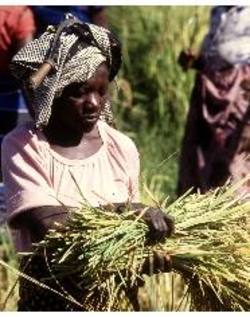
“If you allow foreign investors to perform agriculture, because they have enough capital than the locals, they will overshadow local farmers and as a result Tanzanians will continue to swim on poverty as their products won’t compete in the market.”
Foreign direct investment: A disaster
by Daniel Mbega
The Tanzania government has been advised to draft laws to curb acquisition by foreigners of extensive tracts of the country’s fertile agricultural land as foreign direct investment would be a disaster in years to come.
In a recent interview, a Mbeya rural activist Rev. William Mwamalanga, of the Mbeya Region Environmental Conservation Agency (MRECA), said speculative capital is increasingly making inroads into agriculture in the country at alarming rate.
“Land sales to private or public foreign capital should be banned and repossess land that has already been sold. We need investors, but this is not the kind of investment that would be beneficial to our citizens,” says Rev. Mwamalanga.
He says the government should set limits on further expansion of rural properties in the hands of companies or citizens belonging to foreign countries that regard them as an asset to supply food for their own markets, or as a speculative investment.
Alarm has arisen over the increasing purchases of land in Tanzania in recent years, due to soaring international food prices and the lack of other safe options for financial investment.
However, Hon. Ally Keissy Mohammed, an MP for Nkasi North (CCM), says that land does not grow, so the government should not sale it to foreigners as the local people also need it.
“When we got independence fifty years ago we were about 9 million only, but now we are 45 million. We can till the land and there is no need of leasing it to foreigners. There are so many national parks and game reserves which give small room to citizens. Some of the land is not suitable for agriculture, where will our farmers go? Our leaders should understand this,” Mr. Mohammed says.
He says in 10 or 15 years to come land crises will arise between the locals and investors just like what has happened in Kenya during the Mau Mau era and the recent situation in Zimbabwe.
“Already we have seen pastoralists and farmers fight for land. The population rate in Tanzania is growing fast between 2.5 to 4.2 per cent. Now this foreign direct investment will bring in war as Tanzanians won’t accept to be labours in their own country. All farmers will invade investors as they do in mines.”
He further says, Tanzania has enough cattle, sheep and goats that and doesn’t have a place to sell them and urged the government to create conducive environment for farmers and pastoralists so that they could perform their duties professionally.
As for Basil Mwanakambe, a civil servant, foreign direct investment in agriculture should focus on building agricultural processing industries and setting up enough market for farm products rather than giving them room to cultivate.
He says, because Tanzanian farmers do not have reliable markets for their produce, it was time for investors to focus on that sector and leave the locals to produce so as to widen agricultural processing and marketing and enhance prices.
“The experience is that prices fluctuate so much every year and every season. When prices are unpredictable, planning and forecasting becomes a very challenging task beyond what subsisting farmers would ever desire to experience. At the beginning of the season, farmers do not know what to expect in terms of price, in addition to the uncertain climate and pests, the logical strategy is to diversify production for survival, which is what is commonly called subsisting farming. The subsistence farmer is a jack of all trades and a master of nothing,” he says.
To subject this category of people who constitute 80% of the population, to a liberalised environment, and simply create a “conducive environment” and then expect them to be motivated enough to risk investing their meagre resources to produce goods that could be demanded by the global market, is at best failing to appreciate the complexity of the issues at play.
However, Mr. Basil says the objectives of the Agricultural and Livestock Policy is still far from reality as the assurance of basic food security for the household and the nation has not been reached.
The improvement of standards of life in the rural areas through increased income generation from agricultural and livestock production, processing and marketing has not been reached as most farmers are not given enough assistance from the government and other institution like the financial sector. Most of government plans has remained in papers while at the same time it continue to blame farmers of not producing enough agricultural produce for food and for sale.
“Much of Tanzania’s poor performance in agriculture is a result of faulty policies. This is due to inadequate appreciation for the complexity of policy issues especially regarding the poor. Policies are in many cases intended to influence behaviour. It therefore becomes difficult to figure out how a peasant would take advantage of them.
“If you allow foreign investors to perform agriculture, because they have enough capital than the locals, they will overshadow local farmers and as a result Tanzanians will continue to swim on poverty as their products won’t compete in the market. So the government should empower local farmers,” he adds.
However, Hon. Tundu Lissu, an MP for Singida East (CHADEMA), has warned the government that foreign direct investment would lead the country to unrest as investors scramble for fertile arable land leaving locals tailing behind using a hand hoe.

Daniel Mbega
“Developing countries like Tanzania do not need charity. We need more and smarter investors but not foreigners. Local investors should be given enough room if we really want to save the nation. But everything should be in the open instead of doing things underground just like in the minerals sector,” he says.
According to the United Nations, up to 900 million people are citizens of Least Developed Countries like Tanzania, half of them living on less than two dollars a day, and over the last decade, 60 percent of the world’s refugees originated from those countries.













